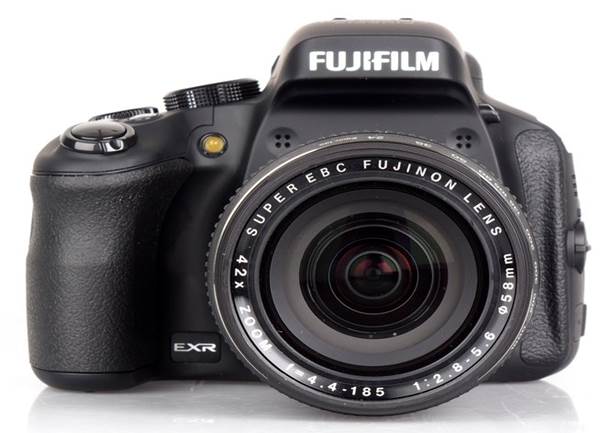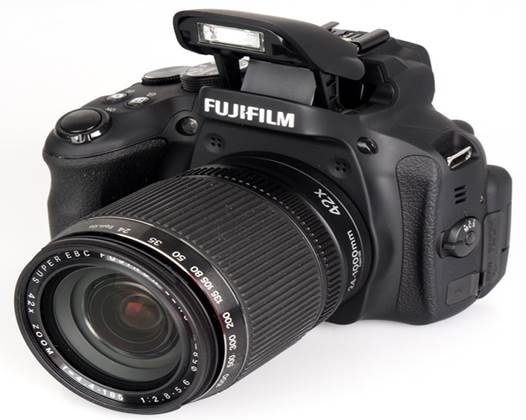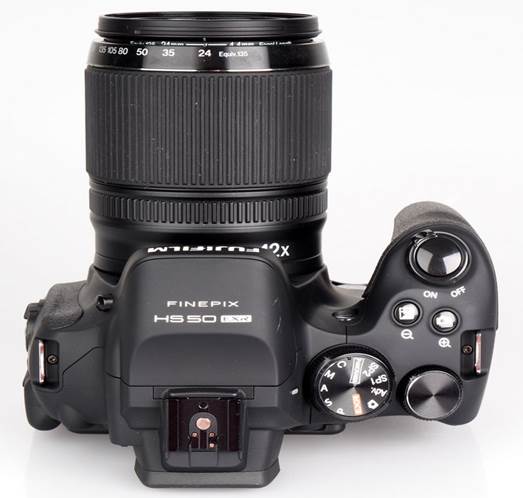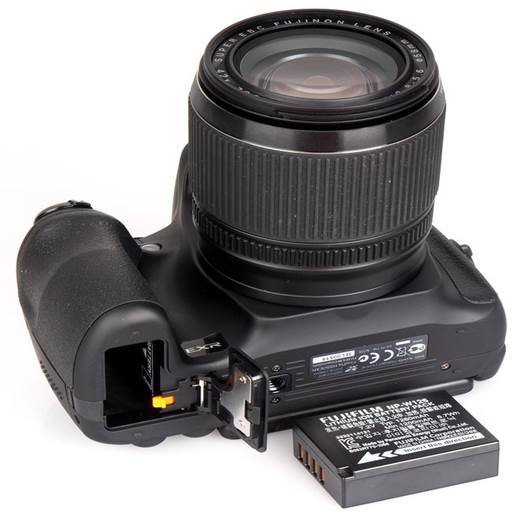The Fujifilm FinePix HS50EXR features a 42x
optical zoom lens equivalent to 24mm wide-angle zooming all the way to 1000mm
at the telephoto end. A 16 megapixel EXR CMOS II sensor features hybrid auto
focus, optical image stabilization, as well as a 3-inch vari-angle tilting
screen.
Functions
The Fujifilm FinePix HS50EXR features a 42x
optical zoom lens equivalent to 24mm wide-angle zooming all the way to 1000mm
at the telephoto end.

Fujifilm
FinePix HS50
Included is Full HD video with stereo
sound, a mic socket, and adjustable microphone level. 11fps continuous shooting
speed at full resolution. Manual controls, RAW shooting, P / A / S / M modes,
manual focus with peaking and focus ring surrounding the lens. On top is a
flash hot-shoe.
The back is a 3-inch (920k dot) tilt /
swivel screen that allows self-portraits as well as tilting up and down for
varied angles, and an EVF (920k dot) with eye-detection sensor to automatically
switch to the EVF when the camera is held up to your eye.

Product
Image
Key Features
·
16 megapixel EXR CMOS II sensor
·
42x optical zoom lens, equivalent to 24-1000mm,
f/2.8 - f/5.6
·
The optical image stabilization
·
3-inch (920k dot) varied-angle screen
·
EVF sensor (920k dot)
·
AF hybrid sensor
·
Manual zoom mode, RAW
·
Full HD video recording at 60fps, great sound
·
ISO 100-12800 (6400 M, S 12800)
·
1cm macro mode
·
High resolution, noise reduction
·
Electronic level
Handling
The camera has a large rubberised grip with
a deep recess for your fingers and on the rear is a good sized section of
rubber grip for your thumb, as well as a large rubber ring around the lens to
aid grip and zoom control. There’s another textured area on the left of the
camera, however this is simply textured plastic. Along with the grip is the
memory card slot and underneath is the battery compartment. On top is drive
buttons.

Product
Image
Surrounding the lens is a large manual zoom
ring, and closer to the body is a focus ring, for manual focusing. A button on
the leff of the camera allows you to switch between manual, continuous and
single focus, with the middle button letting you zoom in when using manual
focus. If you hold the button, you can switch between the standard focus with
focus peaking - the focus peaking mode has a neat bar at the bottom that aids
focus, which shows you how much of the image is in focus, with a dot signifying
optimum focus. In manual focus mode, use the drive buttons to change the
aperture or shutter, instead of pressing the + / - button to convert.

Camera
Lenses
Also on this side is the mic/USB/remote and
HDMI socket, as well as the manual pop up flash button.
A small petal shaped lens hood is provided
and the camera has a 58mm filter at the front, which does not rotate when the
lens is zoomed in or focused.
A Q button allows quick access to the
options on the rear screen, followed by a EVF/LCD button, although EVF also
features an eye-detection sensor and dioptre adjustment. On the other side of
the EVF is a dedicated video button that can be used in any mode, and easily
reached by your thumb. AE / AF lock, 4-way controller with Fn, Flash, Macro,
Timer, and Menu/OK, with display/back and playback buttons underneath. The Fn button
can be customized.
The screen can be tilted, rotated, or
closed, but is not a touch screen. Despite the plastic body the camera feels
well built with good battery and memory compartment covers, although for a
relatively large camera, the tripod thread is plastic. There is one custom
position on the mode dial.

The
camera's display
Menu
The menus are clearly laid out with the photo
options in a set of red color coded menus, setup menus in blue, with playback
in green. During playback, you can mark images to upload to Facebook, Youtube
and MyFinePix, and there are also some ways to search images. Image selection
includes settings for color, tone, sharpness, noise reduction, dynamic range,
microphone level, as well as electronic level.
Battery

The
camera's battery
A 1260mAh 7.2V (typical) rechargeable
lithium-ion battery, which is rated for 500 shots according to CIPA testing
results
Speed
We took some photos to test the
responsiveness of the camera, from switch on to first photo, shot to shot, focusing
speed etc. We took some photos and then use the average to ensure accurate and
consistent tests, making it easy to compare with other cameras.
Shooting RAW limits some of the shooting
options and continuous shooting speeds available (11fps shooting JPEG, 6fps
shooting RAW), as well as a number of available settings, such as bracketing
range and film simulation bracketing which are only available when shooting
JPEG.
Fujifilm FinePix HS50
·
Shutter Response: <0.05
·
Wide - Focus / Shutter Response: 0.2
·
Full zoom - Focus / Shutter Response: 0.2
·
Switch on Time to Taking a Photo: 1.3
·
Shot to Shot without Flash: 1.1
·
Shot to Shot with Flash: 1.1
·
Continuous Shooting – JPEG: 10fps (6 shots)
·
Continuous Shooting – Flash: N/A
·
Continuous Shooting – RAW: 6fps (5 shots)
Sony RX100
·
Shutter Response: 0.0
·
Wide - Focus / Shutter Response: 0.3
·
Full zoom - Focus / Shutter Response: 0.3
·
Switch on Time to Taking a Photo: 2.2
·
Shot to Shot without Flash: 0.9
·
Shot to Shot with Flash: 2.1
·
Continuous Shooting – JPEG: 7fps
·
Continuous Shooting – Flash: 1.6s
·
Continuous Shooting – RAW: 4fps (13 shots)